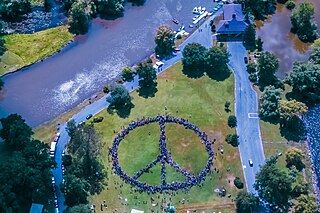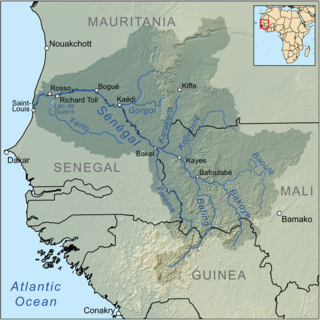
The Horn of Africa (HoA), also known as the Somali Peninsula, is a large peninsula and geopolitical region in East Africa. Located on the easternmost part of the African mainland, it is the fourth largest peninsula in the world. It is composed of Somalia, Djibouti, Ethiopia, Eritrea and Somaliland. Although not common, broader definitions also include parts or all of Kenya and Sudan. It has been described as a region of great geopolitical and strategic importance since it is situated along the southern boundary of the Red Sea, extending hundreds of kilometres into the Gulf of Aden, Guardafui Channel, and Indian Ocean, it also shares a maritime border with the Arabian Peninsula.

Humanitarian aid is material and logistic assistance, usually in the short-term, to people in need. Among the people in need are the homeless, refugees, and victims of natural disasters, wars, and famines. The primary objective of humanitarian aid is to save lives, alleviate suffering, and maintain human dignity.

Hilde Frafjord Johnson is a Norwegian politician from the Christian Democratic Party. She is a former Minister of International Development of Norway, and member of the Norwegian Government. She most recently served as the Special Representative of the Secretary-General and Head of the United Nations Mission in the Republic of South Sudan, completing her term in July 2014

Islamic Relief Worldwide is a faith-inspired humanitarian and development agency which is working to support and empower the world's most vulnerable people.
ODI, formerly the Overseas Development Institute, is a global affairs think tank, founded in 1960. Its mission is "to inspire people to act on injustice and inequality through collaborative research and ideas that matter for people and the planet." It does this through "research, convening and influencing, to lead new thinking and future agendas to deliver transformational change." Its chair is Suma Chakrabarti.
In 2006, an acute shortage of food affected the countries in the Horn of Africa, as well as northeastern Kenya. The United Nations's Food and Agriculture Organization (FAO) estimated on January 6, 2006, that more than 11 million people in these countries may be affected by an impending widespread famine, largely attributed to a severe drought, and exacerbated by military conflicts in the region.

Peacebuilding is an activity that aims to resolve injustice in nonviolent ways and to transform the cultural and structural conditions that generate deadly or destructive conflict. It revolves around developing constructive personal, group, and political relationships across ethnic, religious, class, national, and racial boundaries. The process includes violence prevention; conflict management, resolution, or transformation; and post-conflict reconciliation or trauma healing before, during, and after any given case of violence.
Alexander William Lowndes de Waal, a British researcher on African elite politics, is the executive director of the World Peace Foundation at the Fletcher School of Law and Diplomacy at Tufts University. Previously, he was a fellow of the Harvard Humanitarian Initiative at Harvard University, as well as program director at the Social Science Research Council on AIDS in New York City.

China–Sudan relations are the bilateral relations between the People's Republic of China and the Republic of Sudan. China is currently one of Sudan's largest trade partners, importing oil and exporting low cost manufactured items as well as armaments into the country. Both states enjoy a very robust and productive relationship in the fields of diplomacy, economic trade, and political strategy. They formally established diplomatic relations on February 4, 1959, when Sudan formally recognized the sovereignty of the People's Republic of China and have since become close global allies, supporting each other in times of internal crises and international controversy such as during the Second Sudanese Civil War, the Darfur Crisis, and the Xinjiang Conflict. China continues to provide massive support to Sudan by developing its oil resources and supplying millions of dollars in loans, aid, foreign direct investments, and humanitarian assistance. In return, Sudan has become a reliable political and economic ally in the international arena, allowing China to maintain a significant stake in its oil sector.

A large-scale, drought-induced famine occurred in Africa's Sahel region and many parts of the neighbouring Sénégal River Area from February to August 2010. It is one of many famines to have hit the region in recent times.

Katherine Emily Holt is a British photojournalist, who works primarily across Africa and the Middle East to gather humanitarian and development stories for NGOs and private companies, as well as the UK and global media. She is also the director of communications agency, Arete.

Occurring between July 2011 and mid-2012, a severe drought affected the entire East African region. Said to be "the worst in 60 years", the drought caused a severe food crisis across Somalia, Djibouti, Ethiopia and Kenya that threatened the livelihood of 9.5 million people. Many refugees from southern Somalia fled to neighboring Kenya and Ethiopia, where crowded, unsanitary conditions together with severe malnutrition led to a large number of deaths. Other countries in East Africa, including Sudan, South Sudan and parts of Uganda, were also affected by a food crisis.

A pastoral society is a social group of pastoralists, whose way of life is based on pastoralism, and is typically nomadic. Daily life is centered upon the tending of herds or flocks.
Qatar Charity is a humanitarian and development non-governmental organization in the Middle East. It was founded in 1992 in response to the thousands of children who were made orphans by the Afghanistan war and while orphans still remain a priority cause in the organization's work with more than 150,000 sponsored orphans, it has now expanded its fields of action to include six humanitarian fields and seven development fields.

Hizkias Assefa (1948) is a conflict mediator known widely in Africa for his non-aligned work as a consultant who has mediated in most major conflict situations in sub-Saharan Africa in the past 20 years, as well as in a dozen countries elsewhere. He is also a professor of conflict studies. Of Ethiopian origin, he is based in Nairobi, Kenya. He was one of the founding faculty members in 1994 of the Conflict Transformation Program at Eastern Mennonite University.

Inger Andersen is a Danish economist and environmentalist. In February 2019, she was appointed as the executive director of the United Nations Environment Programme.

James Charles Ingram was an Australian diplomat, philanthropist and author whose career culminated in his post as the eighth executive director of the World Food Programme (WFP), a position which he occupied for ten years.

In the early months of 2017, parts of South Sudan experienced a famine following several years of instability in the country's food supply caused by war and drought. The famine, largely focused in the northern part of the country, affected an estimated five million people. In May 2017, the famine was officially declared to have weakened to a state of severe food insecurity.

In 2017 a drought ravaged Somalia that has left more than 6 million people, or half the country's population, facing food shortages with several water supplies becoming undrinkable due to the possibility of infection.

Squatting in Sudan is defined as the "acquisition and construction of land, within the city boundaries for the purpose of housing in contradiction to Urban Planning and Land laws and building regulations." These informal settlements arose in Khartoum from the 1920s onwards, swelling in the 1960s. By the 1980s, the government was clearing settlements in Khartoum and regularizing them elsewhere. It was estimated that in 2015 that were 200,000 squatters in Khartoum, 180,000 in Nyala, 60,000 in Kassala, 70,000 in Port Sudan and 170,000 in Wad Madani.

















